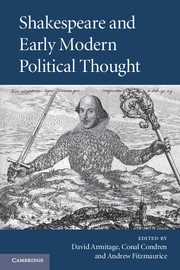Book contents
- Frontmatter
- Contents
- List of contributors
- Acknowledgements
- List of citations and abbreviations
- Introduction
- PART I CONTEXTS
- PART II THE COURT
- 5 Counsel, succession and the politics of Shakespeare's Sonnets
- 6 Educating Hamlet and Prince Hal
- 7 The corruption of Hamlet
- 8 Unfolding ‘the properties of government’: the case of Measure for Measure and the history of political thought
- 9 Shakespeare and the politics of co-authorship: Henry VIII
- PART III THE COMMONWEALTH
- Afterword: Shakespeare and humanist culture
- Index
9 - Shakespeare and the politics of co-authorship: Henry VIII
Published online by Cambridge University Press: 18 January 2010
- Frontmatter
- Contents
- List of contributors
- Acknowledgements
- List of citations and abbreviations
- Introduction
- PART I CONTEXTS
- PART II THE COURT
- 5 Counsel, succession and the politics of Shakespeare's Sonnets
- 6 Educating Hamlet and Prince Hal
- 7 The corruption of Hamlet
- 8 Unfolding ‘the properties of government’: the case of Measure for Measure and the history of political thought
- 9 Shakespeare and the politics of co-authorship: Henry VIII
- PART III THE COMMONWEALTH
- Afterword: Shakespeare and humanist culture
- Index
Summary
Henry VIII or All is True (1613) may seem an unpromising choice for a study of Shakespeare's political thought: in the first place, it is not entirely Shakespeare's work and, in the second, many would argue that it is far from the most successful example of it. Brian Vickers summarises this enduring dissatisfaction with a work that has, unfortunately, two authors. He concludes that for ‘Shakespeare this collaboration, working together with [John] Fletcher throughout a whole play … may have cost him more than he had expected’. This view presents us with a disjointed play the emphases of which change from scene to scene as the work was exchanged between its two writers.
One scene that provides an important test-case of this problem is 4. 2, in which Katherine and her gentleman usher Griffith reflect on the fall of Cardinal Wolsey. Katherine reiterates criticisms we have heard since the beginning of the play: that Wolsey is dishonest, greedy and self-aggrandising. Griffith, rather surprisingly, offers a more generous view. He takes into account Wolsey's impressive social advancement and commends his bounty. To many critics Griffith's judgement reads oddly, but so too does Katherine's immediate acceptance of it:
Whom I most hated living, thou hast made me,
With thy religious truth and modesty,
Now in his ashes honour.
A reason for disbelief is that Katherine opposes Wolsey as ‘mine enemy’ from early in the play (2. 4. 75). This is important, because it gives her moral stature.
- Type
- Chapter
- Information
- Shakespeare and Early Modern Political Thought , pp. 176 - 194Publisher: Cambridge University PressPrint publication year: 2009

